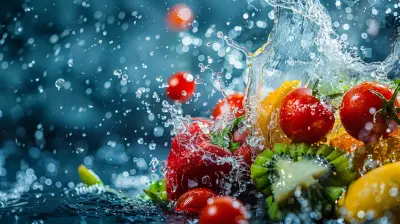The Power of Plant-Based Nutrition in Enhancing Athletic Performance
30 July 2025
Let’s be honest—when we think about elite athletes powering through grueling workouts or breaking records on the field, most of us picture a protein-packed steak or a massive chicken breast fueling that performance. But here’s the curveball... more and more athletes are making the switch to plant-based eating—and thriving like never before.
Yep, you read that right. Plant-based nutrition isn’t just for yogis or health-conscious foodies anymore. It's becoming a game-changer in the world of sports. Whether you’re a weekend warrior chasing a personal best or a professional pushing for the podium, what you put on your plate seriously impacts how you perform.
So, what’s really behind the hype? Let’s break it down.
Why Athletes Are Turning to Plants
Athleticism isn’t just about muscle mass—it's about endurance, recovery, mental clarity, and injury prevention. And that's where a plant-forward diet shines brighter than a spotlight at halftime.More pro athletes than ever are ditching meat and dairy not because it's trendy, but because it's making them feel unstoppable. From tennis legend Venus Williams to NFL linebacker Derrick Morgan, plant-based power is gaining real momentum in the sports world.
But Why the Shift?
Good question. It's all about what plants can do that meat-heavy diets can't.- Faster recovery
- Reduced inflammation
- Improved cardiovascular health
- Sustained energy levels
- Leaner body composition
That’s not just hype—it’s science, backed up by real results from real athletes.
The Athletic Edge: What Plant-Based Foods Bring to the Table
Plants pack in way more nutrients per calorie than processed foods or animal products. It’s like upgrading from regular gas to high-octane fuel.1. Anti-Inflammatory Power
After a tough workout or a rough game, inflammation can be your worst enemy. It slows recovery, increases the risk of injuries, and makes movement stiff and sore.But here’s the kicker—plant-based diets are naturally high in anti-inflammatory compounds like antioxidants and phytonutrients. Foods like berries, leafy greens, turmeric, and nuts help reduce inflammation, helping athletes bounce back faster and train harder.
2. Clean-Burning Energy
Ever feel sluggish after a heavy meal? That’s your body struggling to break down and use animal fats and proteins. Plant foods digest more easily, giving you cleaner, more efficient energy.Complex carbs from foods like quinoa, brown rice, sweet potatoes, and legumes are like premium batteries—they keep your tank full for longer without the crash.
3. Enhanced Recovery
Recovery is where the magic happens—it’s when your muscles rebuild, your tissues repair, and your body gets stronger. Plants happen to be full of micronutrients, powerful vitamins and minerals like magnesium, potassium, vitamin C, and iron, all crucial to speedy recovery.Add to that the natural hydration from fruits and vegetables, and you’ve got a recipe for bouncing back better than ever.
4. Cardiovascular Health
Cardio is king in almost every sport, whether you’re sprinting down a field or outlasting your opponent in a marathon. A plant-rich diet helps keep your blood vessels flexible and clear, lowering blood pressure and improving circulation—hello increased oxygen flow and endurance!
But What About Protein?
Let’s squash this myth once and for all: You can absolutely get enough protein on a plant-based diet.Here's the deal—protein isn’t exclusive to meat. It’s in beans, lentils, tofu, tempeh, seitan, quinoa, nuts, seeds… the list goes on. The key is variety.
Plant-Based Protein MVPs:
- Lentils: Over 18 grams per cup cooked.- Chickpeas: Pack in about 15 grams per cup.
- Tofu & Tempeh: Versatile, easy to cook, and loaded with protein.
- Quinoa: A complete protein (with all nine essential amino acids).
- Hemp seeds and Chia seeds: Tiny but mighty.
Combine different plant protein sources throughout the day, and your muscles won’t miss a beat.
Real-World Plant-Based Athletes Crushing It
If you're still skeptical, just look at the scoreboard.Venus Williams
After being diagnosed with an autoimmune disease, Venus switched to a mostly raw vegan diet. Not only did she manage her symptoms, she came back to elite-level tennis and is still smashing it on the court.Lewis Hamilton
The Formula 1 champ credits his plant-based lifestyle for clearer focus, improved energy, and faster recovery—even with the intense travel and demands of his sport.Scott Jurek
Ultra-marathoner, best-selling author, and plant-based powerhouse. He's dominated grueling 100+ mile races fueled solely by plants.Derrick Morgan
Former NFL linebacker went plant-based with his wife and saw such dramatic performance improvements that he inspired teammates to join him.Busting Common Myths
Let’s tackle some of the biggest misconceptions:“You’ll lose muscle”
Nope. As long as you're eating enough calories and getting a variety of protein-rich plants, your gains are safe—and might even improve thanks to better recovery.“It’s too restrictive”
Actually, a well-planned plant-based diet can be incredibly diverse and flavorful. From Thai curries to Mexican burrito bowls, the options are endless.“You won’t have energy”
On the contrary, most athletes report feeling more energized, less bloated, and mentally sharper.Tips for Transitioning to a Plant-Based Diet as an Athlete
Thinking of making the switch? Go you! But don’t panic. You don’t need to overhaul your world overnight. Small changes can make a big impact.1. Start Slow
Swap one meal a day. Add more veggies to your plate. Try meatless Mondays. This is a marathon, not a sprint.2. Focus on Whole Foods
Stick to minimally processed foods. Think grains, legumes, fruits, veggies, nuts, and seeds. They fuel you better and keep you fuller longer.3. Don’t Forget Fats
Healthy fats are key to hormone health, brain function, and satiety. Add avocados, olive oil, nut butters, and flax seeds to your meals.4. Supplement Smartly
Consider a B12 supplement, and depending on your needs, maybe vitamin D, omega-3 (from algae), or iron. Talk to a nutritionist if you’re unsure.5. Meal Prep is Your Best Friend
When you're training hard, convenience matters. Prepping meals ahead of time keeps you on track and prevents those “I’ll just grab fast food” moments.Game-Changing Plant-Based Meal Ideas for Athletes
Let’s talk about the practical side. What does a day of meals look like for a plant-powered athlete?Breakfast:
- Overnight oats with chia seeds, almond milk, banana, and nuts.- Smoothie with spinach, frozen berries, vegan protein, flaxseeds, and almond butter.
Lunch:
- Chickpea and quinoa salad loaded with colorful veggies and olive oil vinaigrette.- Black bean burrito bowl with brown rice, avocado, salsa, and corn.
Snacks:
- Trail mix with almonds, walnuts, pumpkin seeds, and dark chocolate chunks.- Apple slices with peanut butter.
Dinner:
- Lentil curry with sweet potatoes and brown rice.- Stir-fried tofu with broccoli, bell peppers, garlic, and sesame oil over soba noodles.
Post-Workout:
- Plant-based protein shake with oat milk and frozen fruit.- Hummus and whole grain pita or rice cakes.
The Mind-Body Connection: Beyond the Physical
Here's something a lot of people overlook—a cleaner diet doesn’t just benefit your body. It sharpens your mind.Athletes constantly talk about how going plant-based improved their mental clarity, motivation, and resilience. And let’s not forget the emotional satisfaction that comes from knowing you’re eating in a way that’s not only good for you, but also better for the planet and animals.
It’s bigger than performance. It’s purpose.
Final Thoughts
The power of plant-based nutrition in enhancing athletic performance isn’t just a trend—it’s a transformation. From reduced inflammation and quicker recovery to sustained energy and mental clarity, the benefits are real and tangible.More and more athletes are discovering that true strength doesn't just come from the weight room—it starts in the kitchen.
So whether you’re aiming for your next personal best or just trying to feel your absolute best, it might be time to put more plants on your plate.
Because being strong, fast, and powerful doesn’t mean sacrificing your health. It means fueling it—in every possible way.
all images in this post were generated using AI tools
Category:
Sports NutritionAuthor:

Umberto Flores
Discussion
rate this article
1 comments
Trevor Lozano
Great article! I appreciate how you highlighted the benefits of plant-based nutrition for athletes. It's inspiring to see more athletes embracing this healthy lifestyle.
September 7, 2025 at 3:34 AM

Umberto Flores
Thank you for your kind words! I'm glad you found the article inspiring. Plant-based nutrition truly has incredible benefits for athletes!


